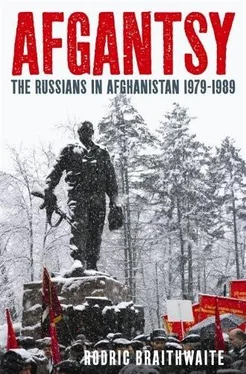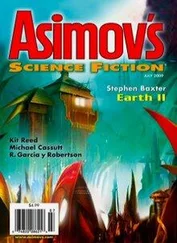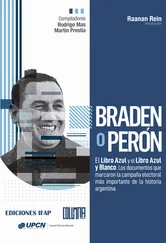The violent events which were now to convulse Afghanistan’s domestic politics presented the Russians with great opportunities and even greater headaches.
Daud had been waiting in the wings since Zahir Shah had sacked him in 1963. In July 1973, while Zahir was on holiday in Italy, Daud deposed him in a bloodless coup, supported by leading members of the PDPA and a group of Communist officers whose names will crop again in this story: Kadyr, Watanjar, and Gulabzoi. Those of Zahir’s relatives who were still in Kabul—one of the princesses was halfway through her wedding—were bundled unceremoniously out of the country. The Soviet Union recognised the new regime two days later. Despite their connections with the Communists, the Russians claim, reasonably convincingly, that they had no part in Daud’s coup.
Zahir Shah’s constitution prohibited members of the royal family from holding a government ministry. So Daud abolished the monarchy and declared himself President and Prime Minister. He denounced the previous decade as a period of ‘false democracy’ and promised ‘revolutionary reforms’. His new government contained members of the PDPA.
More forceful than Zahir, Daud ruled with a rod of iron. The freedom of the parties and the students was curtailed. A former prime minister died mysteriously in prison. There were hundreds of arrests and five political executions, the first in more than forty years. In 1977 Daud pushed through a new constitution which turned Afghanistan into a presidential one-party state, in which only his own party, the National Revolutionary Party, was allowed to operate.
Soon Daud’s spies started to tell him that the Muslim youth organisations and extreme factions among the Communists were plotting his overthrow. He began to move against both. Moscow did its best to get the Communists to support Daud, and warned Daud against pushing his repressions too far. Neither the Communists nor Daud took much notice.
In the summer of 1975 Hekmatyar and other Afghan Muslim leaders, backed by the Pakistani prime minister, Zulfikar Bhutto, launched a series of risings, which were easily suppressed by the government. The leaders were executed, imprisoned, or fled to Pakistan, where they were taken under the wing of the Pakistani Intelligence Service. Many of the survivors—Rabbani, Hekmatyar, Ahmad Shah Masud—had studied together at Kabul University. They later played a major role in the struggle against the Russians. This did not stop them manoeuvring and occasionally fighting viciously against one another, a conflict which broke out with such violence after the Russians left Afghanistan in 1989 that it practically destroyed the country and persuaded the war-weary people that anything—in this case the Taliban, the radical young Islamic fundamentalists who emerged in the early 1990s—would be preferable to a peculiarly murderous civil war.
Daud’s main aims were to build up the internal power of the state at home and its international position abroad. The instrument of both was the army, which he took great pains to strengthen. The Americans refused to help him, so he reinforced the previous practice of seeking arms and training from the Russians. Thousands of Afghan officers and military specialists studied in establishments scattered across some seventy Soviet cities.
But Daud was well aware that a small country should try not to rely too heavily on any one source of outside assistance: he is reputed to have said that his aim was to light his American cigarette with a Russian match. 26He strengthened his relations with the Shah of Iran, who offered him $2 billion on easy terms. The Saudis said they would help him only if he reduced his links with the Soviet Union. He increased his surveillance on the leftist parties, closed several of their publishing houses, purged leftist officials from the government, and released from prison some of the conservative politicians who had languished there since the coup of 1973. Outbreaks of armed opposition from the right, not always distinguishable from banditry, nevertheless occurred in several provinces.
Meanwhile the Soviets continued to increase their support for Daud. Afghan-Soviet trade trebled. There were many more high-level exchanges between Kabul and Moscow. Nikita Khrushchev visited Afghanistan again in 1960, his successor Leonid Brezhnev (1906–82) in 1964. The Treaty of Neutrality and Non-Aggression was renewed for another ten years.
In April 1977 Daud visited Moscow, where he signed a twelve-year agreement for the development of bilateral Soviet–Afghan economic and trade relations. But his meeting with Brezhnev ended in a row. Brezhnev told him to stop leaning towards the West and said he should expel the numerous Western advisers in Afghanistan. Daud stormed out, saying that he was the President of an independent country and would part with his foreign advisers only when he himself decided they were no longer necessary.
He now began to look for ways out of his dependence on the Soviet Union. The US Secretary of State, Cyrus Vance, met Daud in Vienna in October 1977 and invited him to visit the United States. The Americans began to increase their credits and grants to Afghanistan. In January 1978 the US Embassy in Kabul reported that the relationship with Afghanistan was excellent. Daud had accepted Vance’s invitation. Finance for the US military training programme had been doubled to offset—at least in part—Soviet assistance to the Soviet armed forces. And the Afghan government was cooperating, so the embassy said, in the struggle against narcotics.
This rising trend was reversed by the Communist coup of 1978, which brought to power a government determined to turn Afghanistan into a modern socialist state in a matter of years using the techniques perfected by Stalin in Russia and Pol Pot in Cambodia.
By the 1970s Afghanistan had many of the rudiments of a modern state. It was reasonably secure, and you could travel and picnic and see the sights with comparatively little risk. Foreigners who lived in Kabul in the last days before the Communists took over—diplomats, scholars, businessmen, engineers, teachers, aid workers, hippies—later looked back on that time as a golden age. So did many of the very thin crust of the Afghan middle class who lived in Kabul and some of the big cities.
In the 1970s much of old Kabul still stood, a rabbit warren of streets, bazaars, and mosques, still dominated by the great fortress of Bala Hissar, a place, the Emperor Babur said more than four hundred years earlier, with ‘the most pleasing climate in the world… within a day’s ride it is possible to reach a place where the snow never falls. But within two hours one can go where the snows never melt.’ 27
In the centre of the city was the imposing Arg, the fortified palace build by Abdur Rahman, the scene of one violent turn in Afghan politics after another. Amanullah, Abdur Rahman’s grandson, commissioned European architects to build him a monumental new capital, a vast palace, the Dar-ul Aman, on the south-western edge of the city; and a summer resort in Paghman, a village in the nearby hills, complete with Swiss chalets, a theatre, an Arc de Triomphe, a golf course, and a racecourse for elephants. Across the road from the Dar-ul Aman palace stood the Kabul museum, which was opened in 1924 and contained one of the richest collections of Central Asia art and artefacts in the world: flint tools forty thousand years old from Badakhshan, a massive gold hoard from Bagram, glass from Alexandria, Graeco-Roman statuary, ivory panels from India, Islamic and pre-Islamic artefacts from Afghanistan itself, one of the largest coin collections in the world, and more than two thousand rare books. A grandiose British Embassy, built in the 1920s as a symbol of British power, lay on the northern edge of the city. An equally large Soviet Embassy lay in the south-west on the road to the Dar-ul Aman.
Читать дальше












